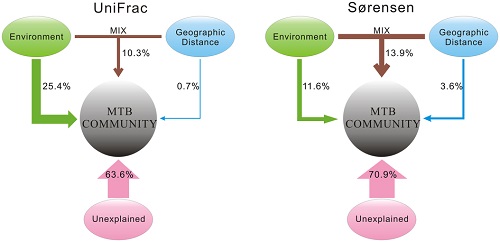|
Sedimentology and Structural Geology
|
Integrating niche-based process and spatial process in biogeography of magnetotactic bacteria
Vice Professor LIN Wei and his team report an investigation of magnetotactic bacteria (MTB) designed to evaluate the roles of niche-based process and spatial process in explaining variation in bacterial communities across large spatial scales. Their results show that both environmental heterogeneity and geographic distance play significant roles in shaping dominant populations of MTB community composition. At the spatial scale in this study, the biogeography of MTB is relatively more influenced by environmental factors than geographic distance, suggesting that local conditions override the effects of dispersal history on structuring MTB community. They found that the strength of geomagnetic field may influence the biogeography of MTB. They argue that MTB have the potential to serve as a model group to uncover the underlying processes that influence microbial biogeography.
Fig. 1 The locations of sampling sites. (Image by LIN)
Fig. 2 Relative importance of different variables in explaining variation in MTB communities between sites. (Image by LIN) Lin et al. Integrating niche-based process and spatial process in biogeography of magnetotactic bacteria. Scientific Reports, 2013, 3: 1643, doi:10.1038/srep01643 (Link) |
Head of Group

Prof. Li ZhongDivision of Lithosphere Evolution Tel: 86 010 82998537 Email: lizhong@mail.iggcas.ac.cn |
-
SIMSSecondary Ion Mass Spectrometer Laboratory
-
MC-ICPMSMultiple-collector ICPMS Laboratory
-
EM & TEMElectron Microprobe and Transmission Electron Microscope Laboratory
-
SISolid Isotope Laboratory
-
StIStable Isotope Laboratory
-
RMPARock-Mineral Preparation and Analysis
-
AAH40Ar/39Ar & (U-Th)/He Laboratory
-
EMLElectron Microscopy Laboratory
-
USCLUranium Series Chronology Laboratory
-
SASeismic Array Laboratory
-
SEELaboratory of Space Environment Exploration Laboratory
-
PGPaleomagnetism and Geochronology Laboratory
-
BioMNSFrance-China Bio-mineralization and Nano-structure Laboratory



